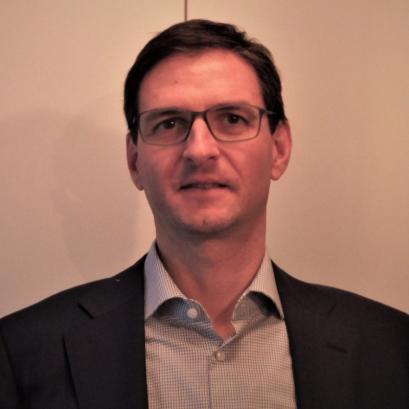
Title: National Competence Centres in the framework of EuroHPC Phase 2
Call ID: DIGITAL-EUROHPC-JU-2022-NCC-01
EU nr: 101101903
Total Budget: € 61,918,783.97
VUB Allocated Budget: 354,384.00€ (including FWO co-financing support)
Contact: Prof. Stefan Weckx and Dr. ir. Ward Poelmans
At ERIS, we got a chance to meet Ward and Stefan and ask them about the impact of EuroCC 2.
What is EuroCC 2 about?
First of all, the EuroCC 2 will facilitate access to European HPC resources while interacting with industries. Moreover, it will deliver trainings, tools and services to support the users. Finally, it will also adopt HPC services in other related fields. These are quantum computing, artificial intelligence (AI) high performance data analytics (HDPA) to expand the HPC user base.
Could you tell us a bit more about the Vlaams Supercomputing centrum (VSC) and the link with EuroCC 2?
The Flemish Supercomputer Center (Vlaams Supercomputer Centrum - VSC) is a partnership between the five Flemish universities and their university associations. The VSC encourages the use of scientific and technical computing in the Flemish academic and industrial landscape. To this end it offers infrastructure (compute, cloud, data storage), training and services. This consortium houses infrastructure in four hubs: the data centers of the universities of Antwerp, Brussels, Ghent and Leuven and is managed by Research Foundation Flanders (FWO).
Do you have a practical example of why we need supercomputing?
Supercomputing operates on a much faster level than a conventional computer and can solve complex problems. There are multiple application areas such as : health care and drug development with the design of new drugs for certain treatments; biology and biotechnology e.g., improving or initiating new products; climate change and weather forecasting e.g., global warming; environment e.g., calculations on high-resolution air quality modelling for the environmental impact; logistics e.g., warehouse productivity and efficiency; industry e.g., optimizing particle processing; space e.g., modelling weather and space environment, and much more as you can see on https://www.vscentrum.be/stories .
As of January 2023, we have a VSC 2.0 plan[1] in which we aim for more cooperation between the five Flemish universities at the TIER-1 level, meaning that each university acts as a single point of contact for a specific service for the whole VSC. This plan was build on more than 15 years of acquired experience. In more detail, UHasselt will continue its actions around communication, marketing and contribute in the development of trainings including MOOCs; UAntwerp will act as liaison with the European level, especially EuroHPC and LUMI (https://www.lumi-supercomputer.eu), and will guide Flemish researchers (academia and industry) when writing proposals to acquire compute time at LUMI; KULeuven will continue to expand the data storage platform for active data to be used on the supercomputer or cloud environment (including various support activities) or search for synergies; UGent will be managing the cloud computing platform and the Tier-1c supercomputer Hortense. Yet, the long term goal is that all universities will be working closely together aiming to capture synergies and bundling common issues and challenges.
So, what will be the role of VUB in VSC 2.0 and EuroCC 2?
In the context of VSC 2.0, VUB will host the research, development and innovation (RDI) office, a new concept within VSC, which centralises all services to non-academic users, comprising activities such as onboarding new companies and supporting current companies that make use of the VSC platform. This will be managed by the scientific data and compute team of DICT (https://hpc.vub.be). In general, this team provides centralized services for scientific computing and data storage to the research community. In the context of the DRI office, two people are closely connected with the industry: one is a technology expert manager to manage access, licenses, and implement the needed support. A second person works as business developer between current and new RDI users (mostly industry) and the VSC. You can contact them at info@vscentrum.be. The ultimate aim is to share best practices such as translating computational problems into solutions.
AIM
The mission of EuroCC 2 is to continue the establishment of a network of National Centres of Competence (NCC) in the most efficient way, while continuing to address the differences in the maturity of HPC deployment in Europe, for which improvement has already been noted. Therefore, in addition to high-level management to monitor progress in the NCCs’ development, the main task of the overall activity is to support national centres in setting up their individual operational frameworks, while accessing and making the most of the experience and expertise currently available at national and European level.
METHODOLOGY
To support this, EuroCC 2 will work closely with a coordination and support action to be funded under DIGITAL-EUROHPC-JU-2022-NCC-01-02. A core team of EuroCC 2 applicants will also participate in the adapted continuation of the CASTIEL CSA (CASTIEL 2), which will be tailored to the needs of the EuroCC (2) NCCs and this time will also involve the Centres of Excellence.
IMPACT
The main goal is to drive collaboration, exchange of best practices and knowledge at the European level and to accelerate the improvement of national and thus European capabilities.
[1] VSC2.0 aims to build further on TIER-1 (compute, data storage, and cloud infrastructure at regional level) and on TIER-2 (supercomputing at university level).
